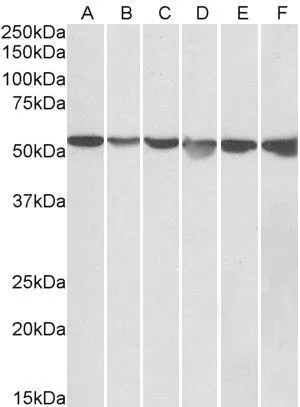
WB analysis of HeLa (A), A431 (B), A549 (C), MCF7 (D), Jurkat (E) and K562 (F) lysates using GTX88240 GPI antibody, Internal (near N-term). Dilution : 0.05μg/ml Loading : 35μg protein in RIPA buffer
GPI antibody, Internal (near N-term)
GTX88240
ApplicationsWestern Blot, ImmunoHistoChemistry, ImmunoHistoChemistry Paraffin
Product group Antibodies
ReactivityHuman
TargetGPI
Overview
- SupplierGeneTex
- Product NameGPI antibody, Internal (near N-term)
- Delivery Days Customer7
- Application Supplier NoteWB: 0.1-0.3microg/ml. IHC-P: 3.75microg/ml. *Optimal dilutions/concentrations should be determined by the researcher.Not tested in other applications.
- ApplicationsWestern Blot, ImmunoHistoChemistry, ImmunoHistoChemistry Paraffin
- CertificationResearch Use Only
- ClonalityPolyclonal
- Concentration0.50 mg/ml
- ConjugateUnconjugated
- Gene ID2821
- Target nameGPI
- Target descriptionglucose-6-phosphate isomerase
- Target synonymsAMF, CNSHA4, GNPI, NLK, PGI, PHI, SA-36, SA36, glucose-6-phosphate isomerase, autocrine motility factor, hexose monophosphate isomerase, hexosephosphate isomerase, neuroleukin, oxoisomerase, phosphoglucose isomerase, phosphohexomutase, phosphohexose isomerase, phosphosaccharomutase, sperm antigen-36
- HostGoat
- IsotypeIgG
- Protein IDP06744
- Protein NameGlucose-6-phosphate isomerase
- Scientific DescriptionThis gene encodes a member of the glucose phosphate isomerase protein family. The encoded protein has been identified as a moonlighting protein based on its ability to perform mechanistically distinct functions. In the cytoplasm, the gene product functions as a glycolytic enzyme (glucose-6-phosphate isomerase) that interconverts glucose-6-phosphate and fructose-6-phosphate. Extracellularly, the encoded protein (also referred to as neuroleukin) functions as a neurotrophic factor that promotes survival of skeletal motor neurons and sensory neurons, and as a lymphokine that induces immunoglobulin secretion. The encoded protein is also referred to as autocrine motility factor based on an additional function as a tumor-secreted cytokine and angiogenic factor. Defects in this gene are the cause of nonspherocytic hemolytic anemia and a severe enzyme deficiency can be associated with hydrops fetalis, immediate neonatal death and neurological impairment. Alternative splicing results in multiple transcript variants. [provided by RefSeq, Aug 2016]
- ReactivityHuman
- Storage Instruction-20°C or -80°C,2°C to 8°C
- UNSPSC41116161

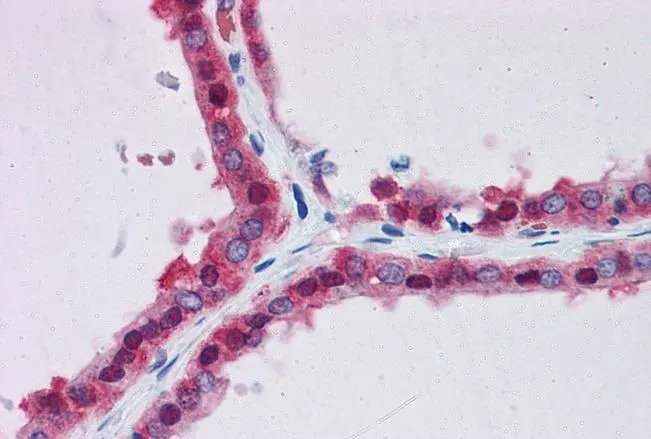
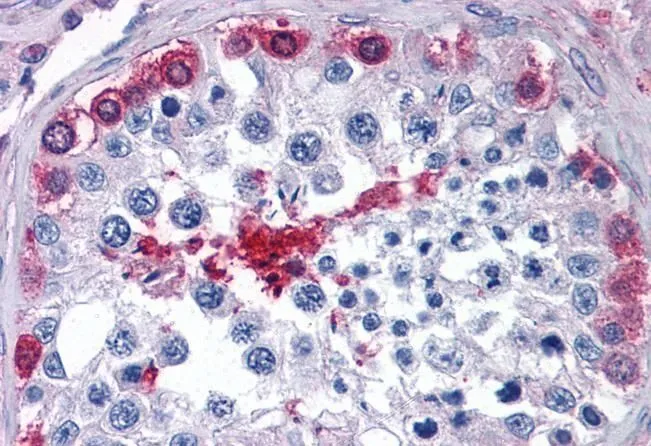

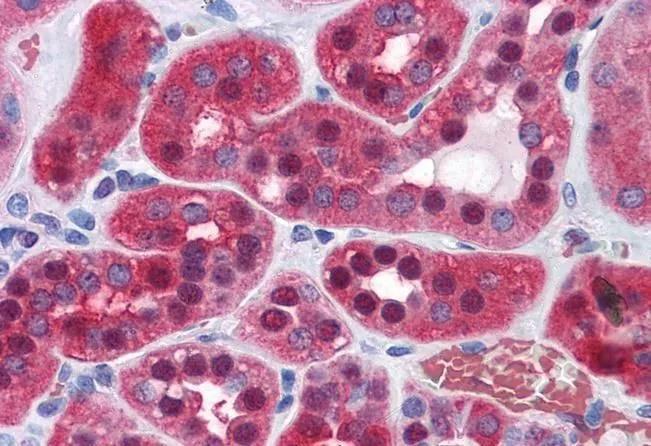


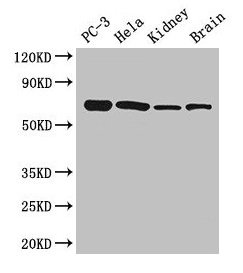

![IHC-P analysis of human Kidney tissue using GTX83039 GPI antibody [1B7D7].](https://www.genetex.com/upload/website/prouct_img/normal/GTX83039/GTX83039_20170912_IHC-P_w_23061322_909.webp)
![WB analysis of HEK293T cells transfected with GPI plasmid (Right) or empty vector (Left) for 48 hrs using GTX84416 GPI antibody [5A11]. Loading : 5 ug per lane](https://www.genetex.com/upload/website/prouct_img/normal/GTX84416/GTX84416_4354_WB_w_23061420_754.webp)
![IHC-P analysis of human ovary adenocarcinoma tissue using GTX84417 GPI antibody [7G10]. Antigen retrieval : Heat-induced epitope retrieval by 10mM citrate buffer, pH6.0, 100oC for 10min. Dilution : 1:50](https://www.genetex.com/upload/website/prouct_img/normal/GTX84417/GTX84417_2693_IHC-P_w_23061420_213.webp)